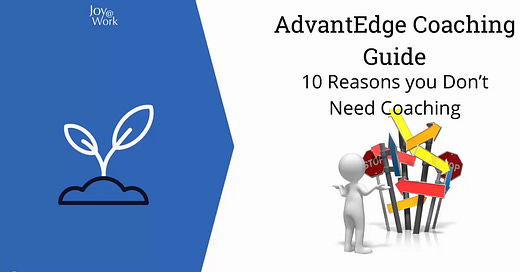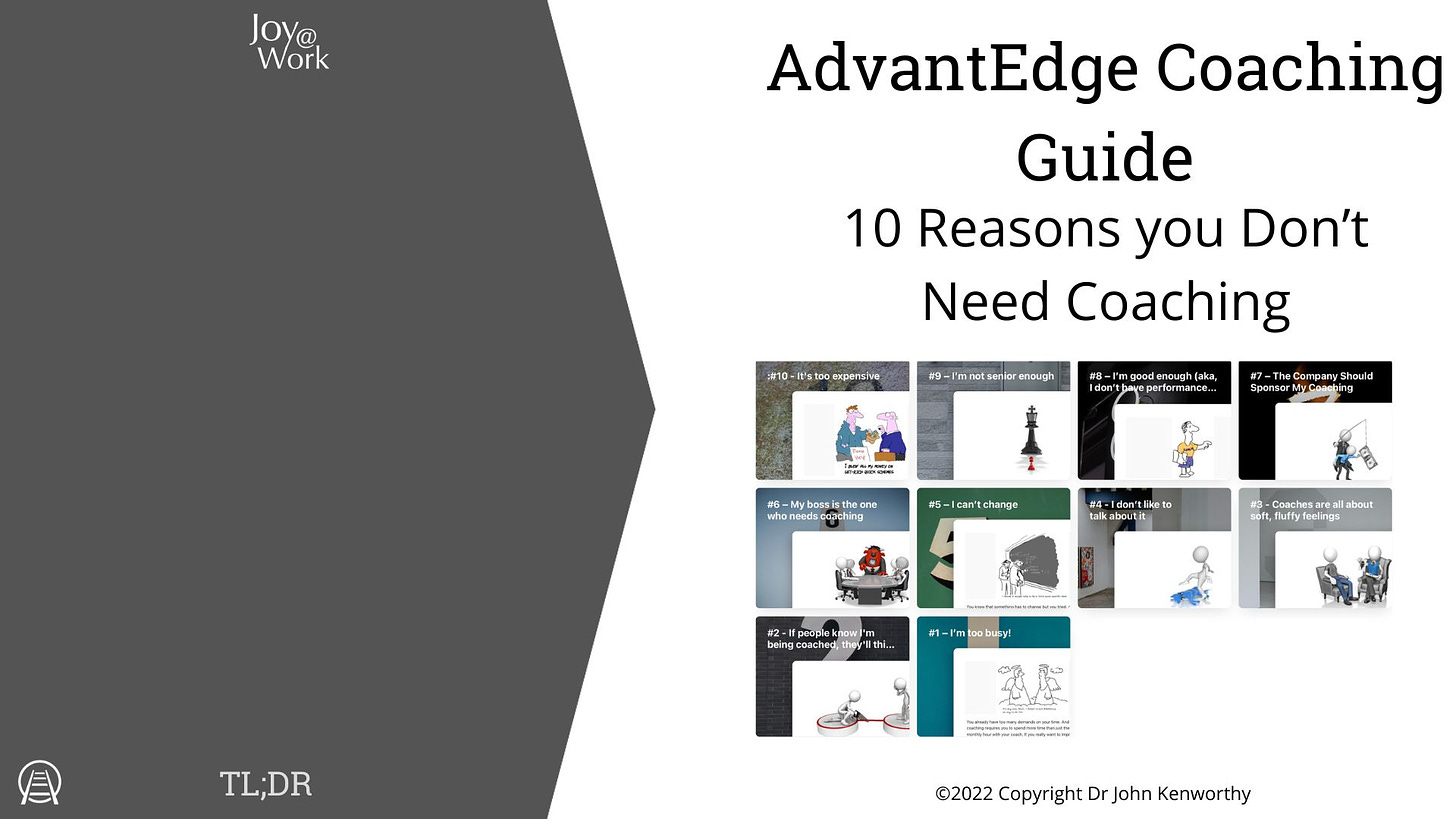The Purpose of this AdvantEdge Guide is to help you make better, informed decisions as you consider coaching to develop yourself or your team and organisation. There’s a lot of very convincing marketing out there that coaching is a panacea for all that ails business and organisation. Your Payoff will be you can understand for yourself, if coaching is suitable for you, and what type or style of coaching might best suit your needs. You’ll also challenge some of the common assumptions that you may have been making.
The truth is, coaching is not for everybody, and there are very good reasons.
Prefer to Listen?
TL;DR (Didn’t watch either :-)
Let’s summarise the top ten reasons people think that they don’t need coaching, and, if you’re still here with me, I’ll wrap up with a couple of cost-free suggestions if you want to explore further.
Here are the top ten reasons people think that they didn’t need coaching in reverse order:
#10: It’s too expensive! The real questions is “how expensive will it be if you don’t change sustainably and develop yourself?”
#9: I’m not senior enough! Will you ever get to the seniority level you need to warrant having a coach without having a coach to help you get there?
#8: I’m good enough! Yes, coaching is often abused to “fix people with problem performance” but it is better used to help good performers become great performers.
#7: The company should sponsor my coaching! The difficulty with company sponsored coaching is clarity of the company and your own expectations and objectives.
#6: My boss is the one who needs coaching! Almost certainly true. Learn from tennis champion, Arthur Ashe: “Start where you are. Use what you have .Do what you can.”
#5: I can’t change! Can’t, won’t or don’t want to change?
#4: I don’t like to talk about it! Indeed, talking about some things, especially with a stranger, can be very difficult. Maybe it’s easier with a stranger. Your coach. Though, is not judging you. Their only intent is to help you.
#3: Coaches are all about soft, fluffy feelings! Yes, some are and they suit certain clients. Some of us are on the more neuroscience-scientific side and robust psychology research. You get to choose the sort of coach you want to work beside.
#2: If people know I’m being coached, they’ll think I’m weak! If, by chance, you think this will reveal your secret, it won’t, it’ll be a relief to them all that they don’t have to be the one to tell you 😜. Anyway, believe me, the only though running through their brain is questioning what you think about them.
#1: I’m too busy! Yes, you are. You want a silver bullet 🚄, a magic formula 🪄and quick and easy solution. Sorry. They don’t exist and please don’t fall for the pundits who are flogging them all over the interweb. Yes. Coaching takes time and good coaching requires you to work between sessions and put things into practice (albeit, these action learning or “homework” are within your current job). Learning takes time. Change takes time. Then, one day, you’ll find things that used to steal your time are almost effortless and you enjoy it all.
You still here?
So either the above reasons haven’t put you off coaching, or none of these has sent you scurrying off to another website already or maybe you’re waiting for the sales pitch?
OK. No pitch. If you want coaching and you want to talk to me about it, you’ll do so anyway.
But maybe you still aren't sure?
Well, I did write a book to help you. But you don’t even have to buy the book (you are very welcome to of course, and you can find it here and I'd appreciate it if you did).
I am offering you a gift to access my book for free! Part One is all about helping you make a good decision about coaching and who to work with of you do.
And all you have to do is follow the links under each of the reasons.
But, may I recommend that you start here?
Buy your copy of the book and get yourself unstuck now!
If you haven’t gone through the chapters and associated worksheets yet, go back and do it now. Remember that applying best practices with discipline and consistency, even if the actual steps seem trite or obvious, is what leads to results!







Share this post